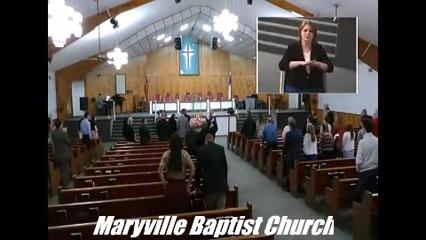 CINCINNATI (Christian News Network) — The Sixth Circuit Court of Appeals in Ohio has unanimously ruled in favor of three members of a Kentucky church who had sued Gov. Andy Beshear over the Commonwealth’s temporary halt on in-person church gatherings.
CINCINNATI (Christian News Network) — The Sixth Circuit Court of Appeals in Ohio has unanimously ruled in favor of three members of a Kentucky church who had sued Gov. Andy Beshear over the Commonwealth’s temporary halt on in-person church gatherings.
“The governor’s restriction on in-person worship services likely ‘prohibits the free exercise’ of ‘religion’ in violation of the First and Fourteenth Amendments,” it wrote. ” … Orders prohibiting religious gatherings, enforced by police officers telling congregants they violated a criminal law and by officers taking down license plate numbers, will chill worship gatherings.”
“There are plenty of less restrictive ways to address these public-health issues. Why not insist that the congregants adhere to social-distancing and other health requirements and leave it at that — just as the governor has done for comparable secular activities? Or perhaps cap the number of congregants coming together at one time?” suggested the three-judge panel, comprised of Judges Jeffrey Sutton, David McKeague and John Nalbandian.
“If the Commonwealth trusts its people to innovate around a crisis in their professional lives, surely it can trust the same people to do the same things in the exercise of their faith.”
The court said that it doesn’t think that Beshear acted in any malice toward people of faith, nor did his stay-at-home order single out worshipers as the governor sincerely sought to slow the spread of COVID-19, but the matter came down to the executive order not being the least restrictive means to address the government interest.
“Keep in mind that the Church and its congregants just want to be treated equally,” the judges stated. “They don’t seek to insulate themselves from the Commonwealth’s general public health guidelines. They simply wish to incorporate them into their worship services. They are willing to practice social distancing. They are willing to follow any hygiene requirements. They do not ask to share a chalice.”
“The governor has offered no good reason for refusing to trust the congregants who promise to use care in worship in just the same way it trusts accountants, lawyers, and laundromat workers to do the same,” the court concluded, and officials cannot “assume the worst when people go to worship but assume the best when people go to work or go about the rest of their daily lives in permitted social settings.”
BACKGROUND
On March 19, Gov. Beshear issued an order prohibiting “mass gatherings,” which “includ[ed] any event or convening that brings together groups of individuals, including, but not limited to, community, civic, public, leisure, faith-based, or sporting events; parades; concerts; festivals; conventions; fundraisers; and similar activities.” It did not state any size allowances.
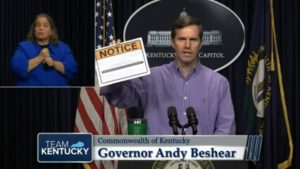 In early April, during his daily COVID-19 update, Beshear warned residents not to attend Easter gatherings, including church services, stating that their license plate numbers would be recorded and submitted to local health departments.
In early April, during his daily COVID-19 update, Beshear warned residents not to attend Easter gatherings, including church services, stating that their license plate numbers would be recorded and submitted to local health departments.
“Any individual that’s going to participate in a mass gathering of any type that we know about this weekend, we are going to record license plates and provide it to local health departments,” he said. “Local health departments are going to come to your door with an order for you to be quarantined for 14 days.”
“Understand that this is the only way that your decision doesn’t kill somebody else, that your decision doesn’t spread the coronavirus in your county and your community,” Beshear continued. “Your decision to go to a mass gathering doesn’t negate the sacrifice of every other house of worship — 99.99 percent that are choosing to do the right thing.”
On Easter, two Kentucky state troopers did indeed record the license plate or VIN numbers of the approximately 50 worshipers at Maryville Baptist Church in Hillview, and members received letters advising that they were consequently required to quarantine. Some attendees went inside the church and some remained in their vehicles and listened to the service via outdoor speakers.
“This vehicle’s presence at this location indicates that its occupants are present at a mass gathering prohibited by orders of the governor and the Cabinet for Health and Family Services,” the notices read in part.
“Employees of the local health department will be contacting those associated with this vehicle with self-quarantine documents, including an agreement requiring this vehicle’s occupants and anyone in the household to self-quarantine for 14 days.”
It also noted, “Please be advised that KRS 39A.990 makes it a Class A misdemeanor to violate an emergency order.”
The church and its pastor, Jack Roberts, soon sued Beshear, stating that an injunction was necessary as they “remain targets of governor Beshear’s enforcement threats.”
The legal challenge read in part:
“Plaintiffs seek a TRO restraining enforcement against Plaintiffs of the various COVID-19 orders issued by Governor Beshear and other Commonwealth officials purporting to prohibit Plaintiffs, on pain of criminal sanctions and mandatory, household-wide quarantines … regardless of whether Plaintiffs meet or exceed the social distancing and hygiene guidelines pursuant to which the Commonwealth disparately and discriminatorily allows so-called ‘life-sustaining’ commercial and non-religious entities (e.g., beer, wine, and liquor stores, warehouse clubs, and supercenters) to accommodate large gatherings of persons without scrutiny or numerical limit.”
Read the lawsuit in full here.
DISTRICT COURT DENIAL
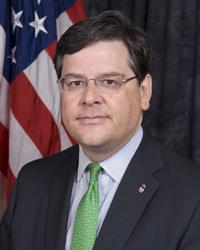 On April 18, U.S. District Judge David Hale, nominated to the bench by then-President Barack Obama, ruled against Maryville Baptist Church, opining that Beshear’s order prohibiting “mass gatherings” does not discriminate against churches as it bans all mass gatherings.
On April 18, U.S. District Judge David Hale, nominated to the bench by then-President Barack Obama, ruled against Maryville Baptist Church, opining that Beshear’s order prohibiting “mass gatherings” does not discriminate against churches as it bans all mass gatherings.
“[U]npersuasive is Plaintiffs’ contention that the orders violate their right to freely exercise their religion by discriminating against religious conduct. Again, the order temporarily prohibits ‘[a]ll mass gatherings,’ not merely religious gatherings,” Hale wrote. “Religious expression is not singled out. And further, contrary to Plaintiffs’ assertions, there are no identified exceptions to the prohibition on mass gatherings.”
He additionally rejected the argument that it is unfair to allow supercenters or liquor stores to remain open while churches may not meet in person, finding that shopping is rather a “transitory experience” while church is more akin to a communal gathering at a concert or restaurant.
“Plaintiffs seek to compare in-person attendance at church services with presence at a liquor store or ‘supercenter store[].’ The latter, however, is a singular and transitory experience:individuals enter the store at various times to purchase various items; they move around the store individually subject to strict social-distancing guidelines set out by state and federal health authorities — and they leave when they have achieved their purpose,” Hale wrote.
“Plaintiffs’ desired church service, in contrast, is by design a communal experience, one for which a a large group of individuals come together at the same time in the same place for the same purpose.”
ATTORNEY GENERAL SIDES WITH CHURCH
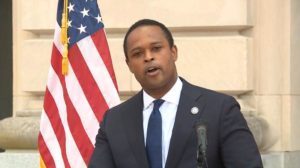 The church appealed, and Kentucky Attorney General Daniel Cameron submitted an amicus brief in support of Maryville Baptist Church and against his own governor.
The church appealed, and Kentucky Attorney General Daniel Cameron submitted an amicus brief in support of Maryville Baptist Church and against his own governor.
“These restrictions apply no matter how large the gathering might be, no matter where the people might get together, and regardless of whether they practice safe social-distancing and good hygiene. This is unconstitutional. But it does not have to be this way,” Cameron wrote.
“By simply implementing the same social-distancing measures for religious gatherings as for liquor stores, retail chains, and offices, the governor could achieve the same state interest in a less-restrictive manner,” he opined.
Cameron stated that churches are indeed being treated unfairly since secular activities are allowed, which makes the governor’s orders “quintessential discrimination against religion [and] requiring the state to meet the high burden of strict scrutiny.”
“Even though these same orders broadly permit individuals to crowd into hardware stores and law offices, or newsrooms, liquor stores and grocery stores, they do not permit people to attend religious services at a church, mosque, synagogue, or other house of worship, even if they follow social-distancing guidelines. This is, without question, an unconstitutional targeting of religious activity,” he wrote.
“Governor Beshear has publicly declared that attending worship service is not life-sustaining, while allowing liquor stores and retailers to continue operating. It is mind-boggling discrimination,” Cameron lamented. “Or as the court noted in a similar case, ‘if beer is ‘essential,’ so is Easter.”
APPEALS COURT RULING
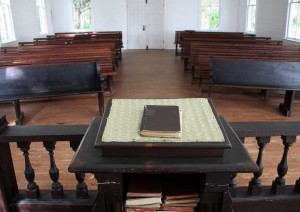
On May 2, the Sixth Circuit Court of Appeals overturned Hale’s ruling to the extent that his decision pertained to drive-in church services. Hale did not think the prohibition applied to drive-in services, but the appeals court did. It then directed Hale to give further consideration in regard to in-person services.
On Friday evening, he released a favorable ruling in light of the appeals court directive.
On Saturday, the Sixth Circuit then issued its ruling in the appeal of Roberts v. Neace, a separate lawsuit involving three attendees of Maryville Baptist Church.
U.S. District Court Judge William Bertelsman, nominated to the bench by then-President Jimmy Carter, upheld the governor’s ban on in-person services on May 4 but ruled in favor of the complainants’ right to travel claim.
“Plaintiffs are not alone in having their lives and activities disrupted by it and the measures that our federal and state governments have taken to address it. Indeed, it is hard to imagine that there is any American that has not been impacted,” he wrote. “But unless a law can be shown to have religion within its cross-hairs, either facially or in application, the fact that religious practices are impinged by it does not contravene the First Amendment.”
Read Bertelsman’s ruling here.
But the Sixth Circuit overturned his decision, as it pertained to in-person church services, on appeal. It used much of the same language that it utilized in its Maryville ruling.
“Assuming all of the same precautions are taken, why can someone safely walk down a grocery store aisle but not a pew? And why can someone safely interact with a brave delivery woman but not with a stoic minister? The Commonwealth has no good answers,” the panel wrote. “While the law may take periodic naps during a pandemic, we will not let it sleep through one.”
“How are in-person meetings with social distancing any different from in-person church services with social distancing? Permitting one but not the other hardly counts as no-more-than necessary lawmaking,” it opined.
The court said that while the church certainly could utilize online streaming as an option for services, “who is to say that every member of the congregation has access to the necessary technology to make that work? Or to say that every member of the congregation must see it as an adequate substitute for what it means when ‘two or three gather in my Name,’ Matthew 18:20, or what it means when ‘not forsaking the assembling of ourselves together,’ Hebrews 10:25.”
“All of us can agree that it’s not easy to decide what is Caesar’s and what is God’s in the context of a pandemic that has different phases and afflicts different parts of the country in different ways. But at this point and in this place, the unexplained breadth of the ban on religious services, together with its haven for numerous secular exceptions, cannot co-exist with a society that places religious freedom in a place of honor in the Bill of Rights: the First Amendment,” it concluded.
Become a Christian News Network Supporter...


